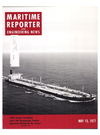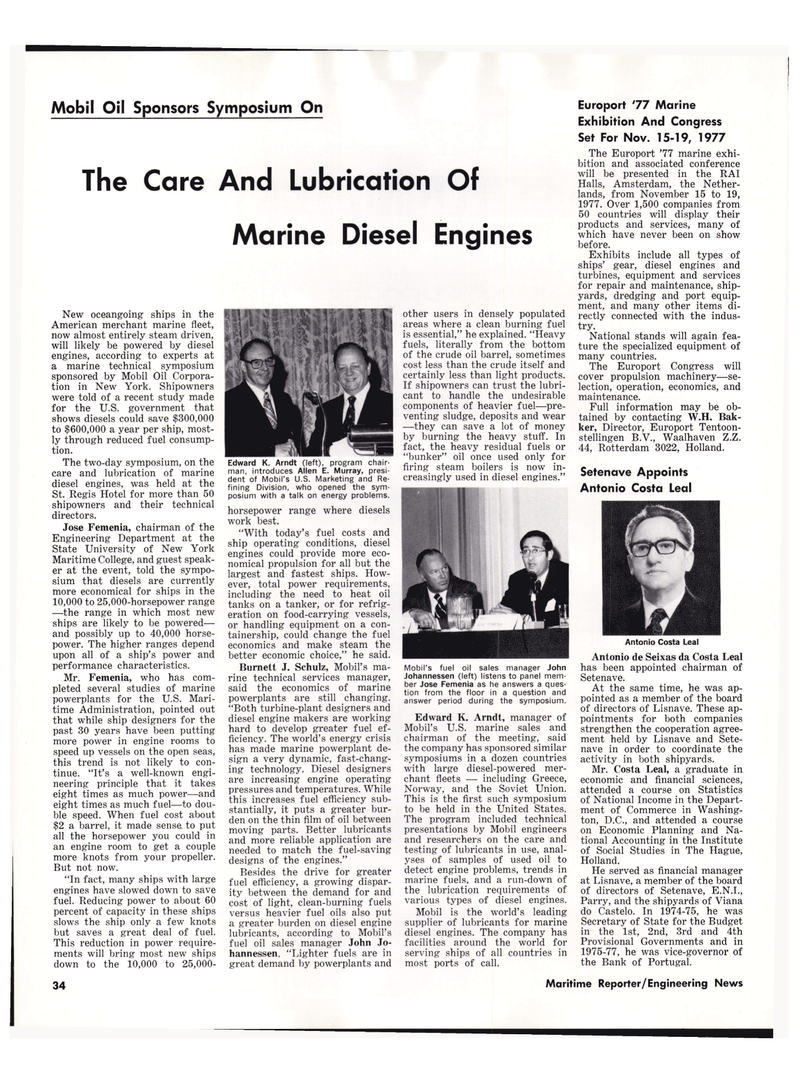
Page 28: of Maritime Reporter Magazine (May 15, 1977)
Read this page in Pdf, Flash or Html5 edition of May 15, 1977 Maritime Reporter Magazine
Mobil Oil Sponsors Symposium On
The Care And Lubrication Of
Marine Diesel Engines
New oceangoing ships in the
American merchant marine fleet, now almost entirely steam driven, will likely be powered by diesel engines, according to experts at a marine technical symposium sponsored by Mobil Oil Corpora- tion in New York. Shipowners were told of a recent study made for the U.S. government that shows diesels could save $300,000 to $600,000 a year per ship, most- ly through reduced fuel consump- tion.
The two-day symposium, on the care and lubrication of marine diesel engines, was held at the
St. Regis Hotel for more than 50 shipowners and their technical directors.
Jose Femenia, chairman of the
Engineering Department at the
State University of New York
Maritime College, and guest speak- er at the event, told the sympo- sium that diesels are currently more economical for ships in the 10,000 to 25,000-horsepower range —the range in which most new ships are likely to be powered— and possibly up to 40,000 horse- power. The higher ranges depend upon all of a ship's power and performance characteristics.
Mr. Femenia, who has com- pleted several studies of marine powerplants for the U.S. Mari- time Administration, pointed out that while ship designers for the past 30 years have been putting more power in engine rooms to speed up vessels on the open seas, this trend is not likely to con- tinue. "It's a well-known engi- neering principle that it takes eight times as much power—and eight times as much fuel—to dou- ble speed. When fuel cost about $2 a barrel, it made sense to put all the horsepower you could in an engine room to get a couple more knots from your propeller.
But not now. "In fact, many ships with large engines have slowed down to save fuel. Reducing power to about 60 percent of capacity in these ships slows the ship only a few knots but saves a great deal of fuel.
This reduction in power require- ments will bring most new ships down to the 10,000 to 25,000-
Edward K. Arndt (left), program chair- man, introduces Allen E. Murray, presi- dent of Mobil's U.S. Marketing and Re- fining Division, who opened the sym- posium with a talk on energy problems. horsepower range where diesels work best. "With today's fuel costs and ship operating conditions, diesel engines could provide more eco- nomical propulsion for all but the largest and fastest ships. How- ever, total power requirements, including the need to heat oil tanks on a tanker, or for refrig- eration on food-carrying vessels, or handling equipment on a con- tainership, could change the fuel economics and make steam the better economic choice," he said.
Burnett J. Schulz, Mobil's ma- rine technical services manager, said the economics of marine powerplants are still changing. "Both turbine-plant designers and diesel engine makers are working hard to develop greater fuel ef- ficiency. The world's energy crisis has made marine powerplant de- sign a very dynamic, fast-chang- ing technology. Diesel designers are increasing engine operating pressures and temperatures. While this increases fuel efficiency sub- stantially, it puts a greater bur- den on the thin film of oil between moving parts. Better lubricants and more reliable application are needed to match the fuel-saving designs of the engines."
Besides the drive for greater fuel efficiency, a growing dispar- ity between the demand for and cost of light, clean-burning fuels versus heavier fuel oils also put a greater burden on diesel engine lubricants, according to Mobil's fuel oil sales manager John Jo- hannessen. "Lighter fuels are in great demand by powerplants and other users in densely populated areas where a clean burning fuel is essential," he explained. "Heavy fuels, literally from the bottom of the crude oil barrel, sometimes cost less than the crude itself and certainly less than light products.
If shipowners can trust the lubri- cant to handle the undesirable components of heavier fuel—pre- venting sludge, deposits and wear —they can save a lot of money by burning the heavy stuff. In fact, the heavy residual fuels or "bunker" oil once used only for firing steam boilers is now in- creasingly used in diesel engines."
Europort '77 Marine
Exhibition And Congress
Set For Nov. 15-19, 1977
The Europort '77 marine exhi- bition and associated conference will be presented in the RAI
Halls, Amsterdam, the Nether- lands, from November 15 to 19, 1977. Over 1,500 companies from 50 countries will display their products and services, many of which have never been on show before.
Exhibits include all types of ships' gear, diesel engines and turbines, equipment and services for repair and maintenance, ship- yards, dredging and port equip- ment, and many other items di- rectly connected with the indus- try.
National stands will again fea- ture the specialized equipment of many countries.
The Europort Congress will cover propulsion machinery—se- lection, operation, economics, and maintenance.
Full information may be ob- tained by contacting W.H. Bak- ker, Director, Europort Tentoon- stellingen B.V., Waalhaven Z.Z. 44, Rotterdam 3022, Holland.
Setenave Appoints
Antonio Costa Leal
Mobil's fuel oil sales manager John
Johannessen (left) listens to panel mem- ber Jose Femenia as he answers a ques- tion from the floor in a question and answer period during the symposium.
Edward K. Arndt, manager of
Mobil's U.S. marine sales and chairman of the meeting, said the company has sponsored similar symposiums in a dozen countries with large diesel-powered mer- chant fleets — including Greece,
Norway, and the Soviet Union.
This is the first such symposium to be held in the United States.
The program included technical presentations by Mobil engineers and researchers on the care and testing of lubricants in use, anal- yses of samples of used oil to detect engine problems, trends in marine fuels, and a run-down of the lubrication requirements of various types of diesel engines.
Mobil is the world's leading supplier of lubricants for marine diesel engines. The company has facilities around the world for serving ships of all countries in most ports of call.
Antonio Costa Leal
Antonio de Seixas da Costa Leal has been appointed chairman of
Setenave.
At the same time, he was ap- pointed as a member of the board of directors of Lisnave. These ap- pointments for both companies strengthen the cooperation agree- ment held by Lisnave and Sete- nave in order to coordinate the activity in both shipyards.
Mr. Costa Leal, a graduate in economic and financial sciences, attended a course on Statistics of National Income in the Depart- ment of Commerce in Washing- ton, D.C., and attended a course on Economic Planning and Na- tional Accounting in the Institute of Social Studies in The Hague,
Holland.
He served as financial manager at Lisnave, a member of the board of directors of Setenave, E.N.I.,
Parry, and the shipyards of Viana do Castelo. In 1974-75, he was
Secretary of State for the Budget in the 1st, 2nd, 3rd and 4th
Provisional Governments and in 1975-77, he was vice-governor of the Bank of Portugal. 10 Maritime Reporter/Engineering News

 27
27

 29
29
